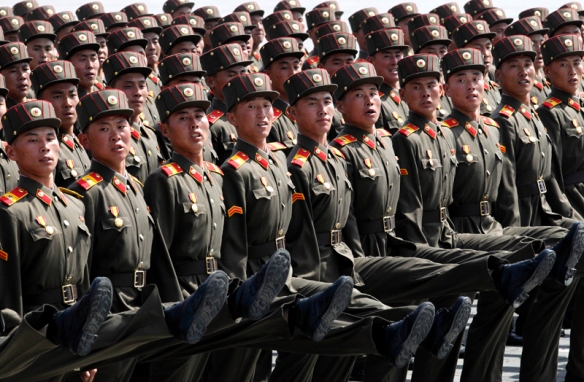
Kim Jong Un speaks at a military parade in Pyongyang celebrating the 100th anniversary of Kim Il Sung’s birth on April 15th, 2012, as seen from space. Photo credit Digital Globe, Inc. via MSNBC.
As far as we know, Kim Jong Il, late president of North Korea, spoke publicly one time only during his thirty years in the limelight of his country’s ruling party. When he did, it was a single line. His father, Kim Il Sung, had given a speech during celebrations for the 60th anniversary of the North Korean People’s Army’s establishment; after the speech, the younger Kim stepped to the microphone and voiced his only public sentiment: “Glory to the heroic soldiers of the Korean people’s army!” (see it in this video).
That was in 1992. The Western media heard his voice a few more times; for instance, in this video from 2007. Still, he gave no more speeches that his own country would hear.
Kim Jong Un gave his first public speech on April 15th, during the 100th-anniversary celebrations of his grandfather’s birth. It is the nation’s most important holiday. The younger Kim’s speech was extensive—20 minutes long—and stands in sharp contrast to his father’s reclusiveness.
Yet the content of the speech matches the sentiment shared by his father’s single line almost perfectly.
He spoke with a confident but unassuming voice and rarely looked up from the text on the lectern in front of him. His voice was comfortable. He fidgeted carelessly throughout, shifting from foot to foot, and gave the impression of having thought very little about how he would convey the speech. He frowned into the sunlight, frowned down at the page, and read as if he were reciting the rules of a class to its participants, glancing up every now and then to check understanding.

Kim Jong Un’s characteristic attitude during his speech. Screenshot from http://www.youtube.com/watch?v=9wYA2WnlV64 courtesy of namaproductions.
Along with addressing the navy, the army, the air force, the strategic rocket unit, the working people of the entire country, and so on, he also addresses “the people in the South and overseas compatriots”, signaling awareness that his speech will be viewed all over the world.
(Note: in the DPRK, South Korea is always referred to as one would refer to a place, not a country: i.e. “south Korea”, uncapitalized, not “South Korea”).
His speech had an obvious primary function: to extol the army and the North’s military-first policy, highlighting the military parade forming a central part of the celebrations. He casts the history of North Korea as a revolutionary history almost totally defined by the development of its military.

North Korean soldiers march in a parade for the 100th-anniversary celebrations of Kim Il Sung’s birth on Sunday, April 15th, 2012. Photo credit Ng Han Guan/AP.
The speech was strongly rooted in the past: Kim Il Sung’s struggles against the Japanese in World War II, his development of the People’s Army, Kim Jong Il’s elaboration of the military-first policy. He constantly referenced Mt. Paektu, the birthplace of Kim Il Sung and the anchor of the region of the original guerilla resistance, and exhorts the army to live into its revolutionary heritage and spirit.
He also described the need for solidarity and comradeship between the commanders and his soldiers, and likewise the supreme commander (himself) and his citizens; it seems likely that the speech was meant to strengthen public support and a perception of strong leadership after the failed rocket launch on April 13th.
Part of his speech was dedicated to the improvement of economic conditions; he says that his party is determined to let its people never tighten their belts again, and enjoy “the prosperity of socialism” as much as they like. However, he adds later, protection of national sovereignty and dignity are even more important, so the military is always the “first, second, and even third” priority.
Some of the content of his speech suggested a special interest in unification.
He conveyed “warm greetings to compatriots in the South and overseas compatriots, who are dedicating everything to the patriotic cause of the unification, wealth, power, and prosperity of the fatherland”, and said that it is “truly a heartbreaking matter” that the Korean people have been suffering under the agony of division for 70 years. He pledged to work responsibly and patiently with anyone who “truly desires the country’s unification and the nation’s prosperity”.
The speech was followed by a massive fireworks display along the Taedong River:

Citizens in Pyongyang enjoy a fireworks show along the banks of the Taedong River celebrating the 100th anniversary of Kim Il Sung’s birth on April 15th, 2012. Photo credit David Guttenfelder/AP.
How should we interpret this speech? The Hindu sage Sri Ramana Maharshi observed that words are the great-grandchildren of the truth. He may not have had North Korea in mind; but even if Kim Jong Un’s speech claimed immediate interest in unification, we would be wise not to expect it to happen immediately. His speech in fact claims much less than that; yet even if his words are only the great-grandchildren of his true thoughts and intentions, they are at least related.
If we trust Kim Jong Un’s words, then, perhaps we can hope not only for the continuation of the relative peace that has prevailed on the peninsula for most of the past two years, but also for dialogue and inter-Korean cooperation returning as a priority for this administration. Kim Jong Un’s address may have focused on the military, with much of the bluster that observers have come to expect from North Korean government statements, but attention to the details gives us cautious hope for a brighter path toward unification on the Korean peninsula.
A full translation of the speech can be found in this transcript, (from which I drew most of my translations): http://www.northkoreatech.org/2012/04/18/english-transcript-of-kim-jong-uns-speech/

